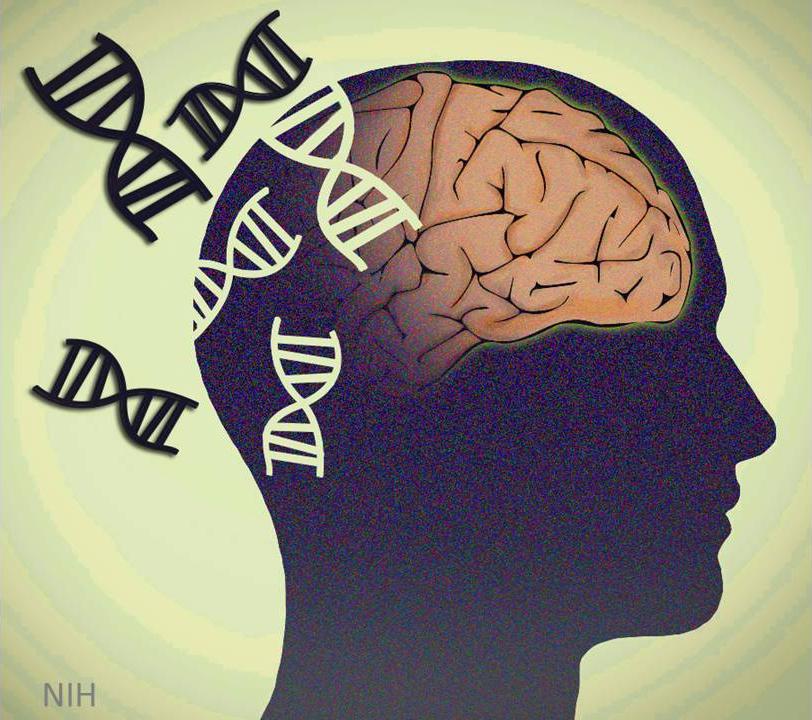A new study in JAMA Psychiatry demonstrates that the contribution of genetic factors to psychiatric diagnoses is minuscule, even in populations beyond those of European ancestry. The researchers analyzed thousands of Han Chinese people and found that genetics explained just 2.3% of whether they received a diagnosis of bipolar disorder (BD) or not.
The authors of the study, which included a team from a Chinese company that sells genetic testing for a variety of conditions, argue that this finding provides evidence for the theorized genetic basis of bipolar disorder. But the data instead reveals that genetic testing for bipolar disorder is useless.
This extends previous research. A recent study found that a polygenic risk score (PRS—a measure which combines the effects of many or all of a person’s genes) could predict just 0.5% of the risk for schizophrenia (while psychosocial factors explained 17% of the risk).
Other studies have found genetic contributions ranging from less than 1% to 2.28%. Researchers have said that these tiny correlations actually provide no useful data.
In fact, even when a supposed contribution is found, the statistical significance obfuscates the actual data. The contribution is so small for two reasons. One is that very few people actually have the genetic difference that is supposedly causing the disorder (tens, or at most hundreds, of people out of the thousands being studied). The other is that people without the diagnosis also have the same genetic difference—meaning that even knowing you have the genetic difference doesn’t tell you whether you “have the disorder” or not.
 In the current study, the researchers analyzed data from 1822 people with bipolar disorder and compared them with 4650 people with no mental health diagnosis. They claim to have detected one gene associated with the diagnosis in Han Chinese people and two genes that are associated regardless of ancestry.
In the current study, the researchers analyzed data from 1822 people with bipolar disorder and compared them with 4650 people with no mental health diagnosis. They claim to have detected one gene associated with the diagnosis in Han Chinese people and two genes that are associated regardless of ancestry.
The researchers also did a meta-analysis to see how their results compared to results from those with European ancestry. They found that some of the genetic findings in Europeans were replicated, but eight genes were not associated with bipolar disorder in their new study, and four other genes were associated but had the opposite effect of reducing the likelihood of bipolar disorder. The researchers suggest that this could be due to ethnic differences—although it is just as likely that the initial findings were false-positives, which would not replicate in future studies.
Conflicts of Interest
In the current study, JAMA Psychiatry specifies that no conflicts of interest were reported for the study authors. However, the last “author” on the list is “the GeseDNA Research Team.” GeseDNA is a Chinese company that sells genetic testing for everything from your personality to your social interactions—although there is no evidence that these can be tested for.
According to a Google translation of their website, GeseDNA is “The only product in China that focuses on psycho-gene testing. The interpretation includes personality, cognitive learning ability, emotional anxiety and depression, social interaction, sports, image, diet, sleep, addiction, and ancestry analysis. Obtain a DNA interpretation of various colors to understand innate advantages and mental health status.”
At the bottom of the article, JAMA Psychiatry admits that this final “author”—GeseDNA—consists of six paid employees of the company.
It’s unclear how this could be considered to be no conflict of interest, especially since the whole paper appears to have been written: “for the GeseDNA Research Team.”
Additionally, there is much money to be made in these sorts of statistically significant findings, even when they are clinically meaningless. Twenty-one different research grants were given out to the research team members to support this research, with further money coming from four non-grant awards.
That’s not even counting the immense number of grants that went to fund the genetic databases from which the researchers pulled their data (14 grants were listed for that purpose, as well as significant funding from pharmaceutical companies Takeda and Roche).
Perhaps these millions of dollars explain why the 49 listed authors (and the six unlisted ones) frame their clinically meaningless finding as if it is groundbreaking research that has found the genetic basis for bipolar disorder.
They write, “This study describes several novel risk loci for BD and a shared genetic basis for BD across Han Chinese and European populations.”
Putting the Findings in Context
According to an accompanying editorial, it is important—even urgent—that researchers conduct studies on the genetic basis of psychiatric disorders in various populations, just in case one day in the future there turns out to be a specific, genetic-based treatment, despite the minimal, clinically insignificant correlations that are consistently found:
“There is an urgent need to increase the ancestral diversity of large discovery GWASs to ensure equitable access to future precision medicine possibilities for all populations,” Niamh Mullins and Hailiang Huang write in the editorial.
The editorial goes on to explain that “Studying the genetics of BD across ancestries presents a plethora of possibilities to advance our understanding of its biological etiology.”
However, it is unclear how tiny correlations like this—which affect but a tiny sample of the population studied and explain less than 3% of the risk for a diagnosis—could help researchers understand the supposed “biological etiology” of bipolar disorder. In fact, they rather show that more than 97% of the reason that someone gets a diagnosis is explained by factors other than biology.
In total, the researchers for the GeseDNA Research Team found that genetics explains 2.3% of whether a person receives a diagnosis of bipolar disorder or not, leaving 97.7% to be explained by other factors, such as childhood experiences, poverty, and trauma.
The researchers also note that a previous analysis of 2000 Han Chinese people found no statistically significant genetic contribution to bipolar disorder. Oddly, that study also framed its result positively: “[Our results] may suggest that there are common and population-specific susceptibility genes for bipolar I disorder.”
The current authors acknowledge that this is misleading, writing that the study’s negative result was likely due to its “small sample size.”
The correlations found by the current researchers are so minuscule that even when previous researchers compared 1000 people with bipolar disorder against 1000 healthy controls, no genetic contribution to the diagnosis was found. Several more thousand people were needed before even a tiny correlation was found.
What does this mean in practice? The accompanying editorial makes it clear:
“PRS for BD, and indeed most complex diseases, are not currently of clinical utility.”
****
Li HJ, Zhang C, Hui L, Zhou DS, Li Y, Zhang CY, … for the GeseDNA Research Team. (2020). Novel risk loci associated with genetic risk for bipolar disorder among Han Chinese individuals: A genome-wide association study and meta-analysis. JAMA Psychiatry. Published online December 2, 2020. doi:10.1001/jamapsychiatry.2020.3738 (Link)















“PRS [polygenic risk score] for BD [bipolar], and indeed most complex diseases, are not currently of clinical utility.”
This is likely because “more than 97% of the reason that someone gets a diagnosis is explained by factors other than biology,” like “childhood experiences, poverty, and trauma,” malpractice cover ups, child abuse cover ups, etc.
But the millions who had the common adverse and withdrawal effects of the antidepressants and ADHD drugs misdiagnosed as “bipolar” should also be mentioned. Not to mention, since the antipsychotics/neuroleptics can create the negative symptoms of “schizophrenia,” via neuroleptic induced deficit syndrome, as well as the positive symptoms of “schizophrenia,” via anticholinergic toxidrome.
It’s highly likely that both “bipolar” and “schizophrenia,” the “complex diseases,” are primarily iatrogenic, not “genetic” illnesses.
Report comment
In other words, there is NO EVIDENCE that these “disorders” are in any way genetically caused. Why not just speak the truth, rather than couching it in arcane jargon? Oh, right, then people might actually get the point, and their sales would drop!
Report comment
Before the use of drugs “mental illness” was episodic and a person would recover and be good for the rest of their lives. Now it is chronic because the drugs cause a chemical imbalance and result in an illness.
It is harder to get people to take addicting deadly drugs when those drugs cause a chemical imbalance. It’s a lot easier if the people believe they are defective and genetic deadbeats who need drugs to be normal. It is similar to how abusive husbands convince the wife she is worthless and would be nothing if she left.
Report comment
How are you going to discover the genetic roots of the standard psychiatric “diagnoses” when they aren’t diagnoses at all, but behavioral descriptions? If I can find multiple causes for each of these supposed diagnoses, how is simple genetic testing going to reach any understanding of the “diagnoses” themselves?
Report comment
Are you using logic again? When will you learn?
Report comment
Hi Peter.
Constantly reinventing themselves. Busy trying to disguise what is really happening.
To any of us gullible public, any criticism of psychiatry conveniently looks suspicious.
Report comment
Thank you for this informative article. It’s a good thing that there is no genetic predisposition to “mental illness.” Otherwise, plenty of children with that predisposition would undoubtedly be aborted.
It would be worthwhile to know, but I’m sure it will never be investigated, everything about these diagnosing psychiatrists. A person’s diagnosis doesn’t just depend on his or her “symptoms,” but the predispositions and beliefs of the psychiatrists. I heard of a psychiatrist who diagnosed literally every patient with bipolar, and I guess, drugged them accordingly. Psychiatrists can’t even agree with each other about a person’s diagnosis. The only thing they’re sure of is that all of their patients are mentally ill and need drugs.
Report comment
“I heard of a psychiatrist who diagnosed literally every patient with bipolar, and I guess, drugged them accordingly.”
It’s why they needed a bigger DSM, so they could look more like specialists 🙂 Depending what is PC, I’m sure a few will get removed. A few diagnosis are definitely popular.
Report comment
Kickbacks, anyone?
Report comment
Then we read other articles that report that black people are more likely to get a psych diagnosis.
So then, is it because their genes made them black and caused them to suffer from the fallout of slavery and injustices?
So is it then possible that all colours are vulnerable to the fallouts of generational oppressions and reactions to the oppressions? Is the “gene” possibly related to being less powerful? And once we identify that genetically a lot of people are more vulnerable to being kicked around or excluded, just not as robust to withstand, then we cannot conclude that they are ill. We can only conclude that many people have reactions to being oppressed. The cloud of unhappiness due to being the poor or oppressed can follow for many generations.
Of course “genetic” testing for reactions to being beaten is ludicrous, but it would be convenient for the powerful to find a commonality in the genes of oppressed people. Especially if they benefit from the diagnosis and drugging of generations of reactions to unhappy and oppressed environments.
So really, all they could ever prove is that there is indeed the powerful and vulnerable. Not vulnerability to depression but rather vulnerability to oppression. Reactions are not disease, disorders, or illness.
Report comment
Everything that has to do with phenotype, whether it’s susceptibility to disease, physical appearance or mental health, is a result of genes interacting with the environment. Think about it. If we had the genes of a mouse, our behavior would be very different; alternatively, if we were raised on Mars, our behavior would be very different from Earthly counterparts. A good example of how genes and environment affect behavioral outcome is the response of some individuals to marijuana use. Whether it is studies of siblings in Australia (McGrath et al.) or twins in Sweden (Kendler et al.), the young person using marijuana is more likely to develop psychosis, yet not all individuals worldwide suffer this risk. (about 5% of those who use potent marijuana heavily could be expected to develop a psychotic disorder; DiForti et al.). What this means is that both environment (in this case, marijuana use – McGrath et al. and Kendler et al.) and innate differences between individuals (DiForti et al.) make a difference. We just don’t know what genes make a difference for each environmental variable, and the PRS scores were researchers best attempt to put together a set of genes that could account for all environmental forces of importance, but they failed to develop a set that applied to enough people to be meaningful. With marijuana as the environmental variable, there will undoubtedly be genes of risk that are specific to THC metabolism and THC receptors, and not all those genes are well characterized at this point in time and were unlikely to be part of the PRS scores for behavioral disorders.
What must be done is to set up a PRS score for each environmental component thought to increase risk for a particular behavioral disorder, and then we might get somewhere. But to say that genes aren’t important in behavior because the set of genes chosen for the PRS analysis weren’t correct, is ridiculous. Anyone who maintains that genes have no role in behavior is ignoring the differences in behavior that clearly exist between other species and humans, and those differences have nothing to do with environment.
Report comment
Certainly. But a very important question that is generally avoided is this: genetics contributes to behavioral decisions. SO WHAT? Genetics is not something that can be modified, except through epigenetics, which is directed by, guess what, EXPERIENCE. So why do we spend millions and millions studying genetic vulnerability when we can’t do anything about it? Wouldn’t it be more productive to direct the bulk of those dollars toward finding what kind of environment helps people succeed emotionally and mentally and toward creating such environments?
As an example, it’s likely that a certain percentage (but very far from all) of “ADHD” cases are no doubt strongly influenced by a genetic tendency to be more active than other kids. These kids don’t succeed in a regular classroom very easily. So is the answer to try and alter their brain chemistry (seeing as the genes are not changeable)? Or is the answer to create environments that allow such kids to be active and to learn in the way they learn best?
Finally, before we ascribe specific behavioral tendencies to genetics, ought we not to have evidence of what genes affect what behavior? Yet decades of research provide almost no information about this. Why do we imagine that’s going to change somehow?
Report comment
gene studies are the smokescreen. Sigh.
Report comment